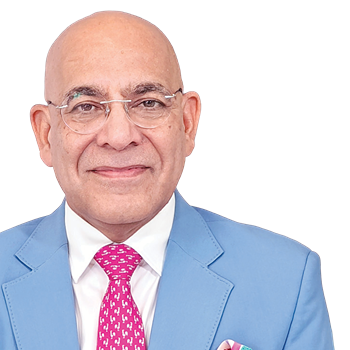EQ: The Needed Human Algorithm

In an era dominated by algorithmic intelligence and relentless digital acceleration, a potent human force is re-emerging as the critical differentiator in the C-suite: emotional intelligence, also known as Emotional Quotient (EQ). As AI handles data, top Indian and global CEOs are strategically integrating EQ into their leadership DNA and decision-making core. They recognise that understanding the 'why' behind the numbers, traversing human complexities, and fostering genuine connections are irreplaceable. But, can this EQ-driven approach tangibly boost results, especially in high-pressure corporate arenas? This isn't about soft skills, it's about hard outcomes and smarter risk-taking and sustainable innovation. We speak with leading corporate executives to uncover how they leverage EQ as a strategic lever for superior business performance
Contributed by Avinash Rajput, Eeshwari Jedhe, Ekta Katti, Kalyani Sardesai and Sangeeta Ghosh Dastidar
Emotional agility with digital fluency is the key
-RIDHIMA SAWANT,
Chief Transformation Officer, Orient
Technologies

In a world full of digital noise, many of us are becoming emotionally numb and disconnected from the very human connection we need the most. Since we spend most of our time at work, the workplace becomes a second home. And, the leader of that home must be emotionally resilient – someone who can navigate uncertainty, inspire trust, and create a culture that feels like home sweet home. To do that, a leader must first understand themselves. Self-awareness fuels clarity, making decision-making easier, even in high-stress situations. Strategic leadership begins with inner alignment. When leaders truly know themselves, they can better motivate, influence, and align others toward a shared purpose. Empathy, acceptance and safety, are the building blocks of a high-performing culture. When people feel seen and heard, they don’t just work, they contribute with heart and meaning. The future of leadership lies in blending emotional agility with digital fluency. That’s why today’s CEOs are turning to coaching, reverse mentoring, and leadership labs that focus on what machines can’t replicate—that is empathy, ethics, and adaptability. Data reveals the "what" and empathy uncovers the "why". Great leaders use both - insight to inform and intuition to inspire. Under pressure, it’s emotional intelligence that ensures decisions are not just effective, but truly human.
Emotions are strategic differentiator
-SURJYA NARAYAN MOHAPATRO,
Vice President, Standard Chartered

In an age defined by AI, data abundance and relentless digital acceleration, emotional intelligence is emerging as a critical strategic differentiator in leadership. In this era, leadership redefines decision making by integrating empathy, self-awareness, and social intelligence. Rather than relying solely on analytics, it is imperative to foster cultures where listening, adaptability and emotional attunement, guide strategic direction. In high-stress sectors like tech and finance, where volatility and burnout are common, EQ driven leadership has proven to enhance resilience, collaboration and long-term performance. It humanises organisations, making them more agile and aligned with stakeholder expectations. A leader with high EQ does not just manage disruption, they inspire through it by cultivating trust and psychological safety that directly influence innovation and execution. Emotional intelligence is no longer a 'soft skill', it is a hard edge—a measurable asset that shapes business outcomes. As machines become smarter, the human capacity to connect, motivate and empathise, becomes the defining advantage. Indian and global CEOs who recognise this are not just leading companies, they are also shaping future ready cultures where intelligence is both artificial and deeply human.
Lead with your gut and heart
-SUSHIL SURI,
Chairman and Managing Director, Morepen
Laboratories Ltd.

According to studies, people aged 16 to 64 spend roughly 40 to 42 per cent of their waking hours on screens. Considering that scary fact, and in a world dominated by digital interfaces, endless content, ever-evolving aspirations, and with AI surrounding us, emotional intelligence has become a survival trait. This surge in screen time and digital engagement has set unrealistic standards, inflated expectations, and created invisible pressures. Only a leader with high EQ, can not only stay grounded, but also uplift others with empathy. However, I believe that a leader's EQ can only be high when they are deeply self-aware. Leadership begins the moment you start listening to your inner voice, while tuning out the external noise. Today’s leaders are striving to build emotionally intelligent cultures, by valuing "me time", prioritising one-on-one conversations, and investing in meaningful, quality interactions. These efforts are shaping organisations that think, feel and create. Such cultures shape both the company and its people for the better. Yet, as AI becomes increasingly integrated into our lives, we risk losing our edge if we don’t pair it with human intuition. Leaders must rely on the timeless tools of gut instinct, empathy and self-awareness. In a data-driven world, balancing analytics with emotion requires leaders to pause, reflect, meditate, pursue hobbies, and create intentional space for stillness. This practice not only enhances performance under pressure, but also deepens understanding of their team.
EQ is leader’s best tool
-AKSHA KAMBOJ,
Executive Chairperson, Aspect Global
Ventures

As we continue to evolve, especially in this tech-driven world, EQ is no longer optional. It is the need of the hour and must be practiced at all costs. Today, what sets a great leader apart is their EQ level. The higher it is, the better their team performs, and so does the company. Knowing the team, the people, their pain points, their strengths and weaknesses, and addressing them in a civilised and respectful manner helps leaders manage and guide their teams efficiently. This process must be rooted in trust and empathy. However, for a leader to become a great leader, self-awareness is the foundation of EQ. It is the first and most pivotal step toward strategic leadership. Without self-awareness, decisions become reactive. When leaders understand their own emotions, they are far more capable of inspiring, engaging, and resolving issues. A company’s foundation should be built on emotional intelligence. It should foster high-performing cultures where individuals feel seen, supported and empowered. These emotionally intelligent cultures significantly impact performance. A high-EQ environment is a boon for all. As AI continues to take over routine tasks, EQ will become the defining trait of the next generation of leaders. EQ is not a soft skill, it is a powerful leadership tool.
Leaders can motivate future generations through EQ
-AMIT SRIVASTAVA,
Founder and Chief Catalyst, Nutrify Today

In today's fast-paced world, where robots are taking over more of our everyday lives, work and comfort, emotional intelligence is one of the most important qualities for leaders, as part of interpersonal relationships and skills. As technology continues to perform tasks at an amazing pace without human supervision, a worrying trend emerges— neglecting our mental health. We are seeing alarming rises in mental health issues like depression and disturbing increases in social problems like violence and tragic events. Leaders have a significant work to do in creating environments where emotional intelligence is valued. Leaders can motivate future generations to embrace these norms by demonstrating an appropriate mindset, providing sound guidance, and showing compassion. This kind of legacy is crucial because it gives future leaders the power to make their teams collaborate effectively and stand out, improving workplace culture. High emotional intelligence is essential for fostering team collaborations. When leaders prioritise emotional intelligence, they ensure everyone feels appreciated, understood, and motivated to contribute. This not only improves efficiency, but also creates group cohesion and mutual responsibility. We must not lose the fundamental humanity that connects us in an increasingly tech-driven world. By promoting emotional intelligence and prioritising communication and understanding, we can create a culture that values well-being and collaboration, helping people grow stronger and more resilient.
Emotion helps build loyalty
-CHANDRA BHUSHAN,
Country Head, Enigmatic Smile (Single.id)

CEOs who bring the best of both worlds together—integrating emotional quotient into their decision-making as well as AI and digital acceleration, into their operations and administrative processes—will run far more successful businesses. CEOs with high emotional intelligence are more likely to embed empathy into product design, privacy frameworks and user engagement strategies, leading to stronger brand loyalty and long-term growth. Our company operates in a space where technology intersects with human emotion of consumer happiness that comes from winning, earning, and redeeming rewards or cash back from purchases. Therefore, EQ is critical for understanding consumer mindsets when creating technology platforms that make shopping experiences seamless, hassle-free, fun and safe. The retail sector is emotion-driven from consumers' perspectives, making it essential for CEOs to integrate EQ into business decisions, both in-house practices and consumer-facing strategies. AI is capable of processing and analysing data at unprecedented speed, but emotional intelligence enables leaders to understand the human impact of their decisions, foster trust, create strong collaborative teams, and build loyalty. At the end of the day, we are human beings with real emotions like empathy and intuition, not robots. Leaders who balance head and heart in the workplace will build strong, loyal teams, make sound judgments, and navigate their companies through difficult situations with rare foresight and deep understanding of human psychology. In a world that is dynamically AI-led, EQ-driven leadership is equally crucial.
EQ gives competitive advantage
-BIPLOB BARIK,
CEO & Founder, Citrus Freight

I believe EQ has emerged as a critical differentiator in leadership, especially in an era dominated by AI and digital transformation. Technology has streamlined processes, but it has also intensified pressure, uncertainty, and change across industries. Leaders with high EQ are better equipped to navigate this complexity by building trust, fostering resilience, and maintaining clarity during high-stakes decision-making. Top Indian and global CEOs are increasingly integrating EQ into their leadership playbooks. This is visible in how they prioritise transparent communication, create psychologically safe workplaces, and balance data-driven insights with human-centred judgment. In sectors like tech, finance, and media, where volatility is high, EQ-driven leaders are often more effective at managing crises, retaining top talent, and maintaining customer loyalty. The business impact is tangible. EQ-driven decision-making leads to lower attrition, faster alignment on strategic priorities, and more innovative problem-solving. During market disruptions, emotionally intelligent leaders can rally teams to adapt quickly without losing morale. In my experience, organisations that intentionally build EQ at the leadership level are not only more agile but also more sustainable. In today’s environment, EQ isn’t a soft skill—it’s a competitive advantage.
Leaders can utilise emotions effectively
-CA PRAJAKTA SHETYE-DEO,
Co-Founder, Posiview Consulting Partners

In this age of AI and digital acceleration, interactions are increasingly getting more digital, technology driven and impersonal. However, outcomes continue to be human-dependent. Hence, leaders need to possess high emotional intelligence to navigate this dichotomy. Leaders with a high EQ can comprehend, manage and utilise, both their own and others emotions effectively and thus make more thoughtful, less rash decisions, even in stressful situations. They consider how decisions may impact teams, peers and stakeholders emotionally, thereby making the resulting actions more inclusive.
The trend is to use AI-generated data to drive decision-making. Complex decisions do require analytics and understanding data. However, CEOs can use EQ to bring in an understanding of behavior and relationships, to decision-making. Awareness of how feelings influence action, and action in turn impact feelings of others, which influences action again, is important. This helps CEOs to take decisions that are not only data-driven but also align with values and long-term objectives of the organisation.
The high level of stress in the finance sector largely stems from resources having to meet aggressive deadlines, manage co-ordination and collation from multiple teams for their deliverables and still be responsible for accuracy. EQ-driven leadership ensures that their teams handle pressure situations without feeling the heat and deliver reliable performance. Having a leader understand, empathise and support your efforts, makes a team member feel highly valued in the organisation. This leads to having a motivated team that delivers consistently good performance and has lower attrition.
EQ directly impacts business outcomes
-NAMRATA PUROHIT,
Global HR Professional & Corp Comm Expert

As a Psychology graduate with German language proficiency and a background in HR, I’ve spent years setting up HR operations processes focused on improving employee experience. From building systems to driving people strategies, I’ve learned that efficiency means little without empathy. In the current era of AI and automation, EQ stands out as a strategic differentiator. While technology can streamline tasks and mimic responses, it can’t connect emotionally, understand cultural nuances or build human trust.
EQ directly impacts business outcomes. I’ve always believed in truly listening to colleagues, peers and team members. When people feel heard, both professionally and personally, they feel valued. Valued employees don’t just meet goals, they exceed them
While AI tools can run feedback loops or pulse checks, the confidence that those responses will lead to real human understanding is often missing. That’s where the human touch matters most. Trust cannot be automated, it must be earned, conversation by conversation.
Leadership, to me, isn’t defined by a title or the number of people you manage. Every employee is a leader. Even as a cross-functional individual contributor today, I believe leadership is an attitude—a choice to represent the organisation with integrity, ownership and empathy, regardless of role.
In high-stress industries, this kind of EQ-driven leadership is vital. The future of leadership lies in the blend — AI for speed and structure, and EQ for soul and connection. Because, no matter how fast technology evolves, nothing replaces a human heart that listens and leads with empathy.